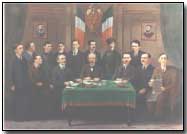Frank C. J. MacDermot (25 November 1886 – 24 June 1975) was an Irish barrister and politician.
MacDermot was born in Dublin, the seventh and youngest son of Hugh Hyacinth O'Rorke MacDermot, Prince of Coolavin. He was educated at Downside School and the University of Oxford and qualified as a barrister. He was commissioned into the Army Service Corps during World War I and ended the war as a Major. He later emigrated to the United States and became a banker in New York City from 1919–27. He returned to Ireland in the late 1920s and stood unsuccessfully as an Independent Republican candidate for Belfast West in the 1929 United Kingdom general election. An Anglophile he was elected to Dáil Éireann in the 1932 Irish general election as an Independent Teachta Dála (TD) for Roscommon. He founded the National Centre Party that year with James Dillon and became the party’s leader.
He was a persistent critic of Fianna Fáil and Éamon de Valera. He criticised the abolition of the oath of allegiance, the abolition of the Free State Seanad Éireann, the abolition of the Governor-General and the introduction of the Constitution of Ireland in 1937 arguing each time that these actions would copper-fasten partition and arguing of the need for rapprochement with the government of Northern Ireland and the wider Unionist Community. He continually stated that partition could only be addressed when Dublin-London relationships were normalised. He was widely regarded as one of the best speakers in the Dáil.
In 1933 he led the National Centre Party to merge with Cumann na nGaedheal and the Blueshirts to form Fine Gael and MacDermot became a Vice-President of the party. He did not seek re-election in 1937 but surprisingly joined Fianna Fáil that year. He had had personal differences with his Fine Gael colleagues on issues such as the degree of emphasis to be given to Ireland's membership of the Commonwealth. De Valera appointed him to the re-established Seanad as a Senator in 1938. He remained in the Seanad until 1943. During World War II, he was a critic of Irish neutrality throughout his time in the upper house, arguing that Ireland should be fighting with the allies. He subsequently became the U.S. and Paris correspondent for The Irish Times newspaper.

No comments:
Post a Comment